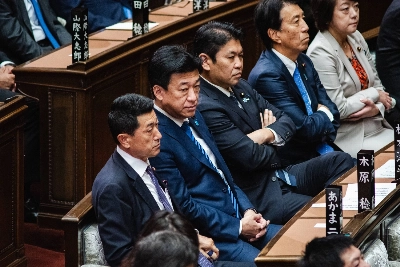Make no mistake: The administration of U.S. President George W. Bush wants to wage war against Iraq. Whether it will do so is another matter; whether it should do so is yet another question. The skeptics received a real boost with the publication of a critique of U.S. foreign policy by former National Security Adviser Brent Scowcroft in which he questioned the U.S. government's seeming readiness to go to war with Iraq. Mr. Scowcroft's willingness to go public with his criticism is an indication of the deep divisions in the United States over the advisability of going to war with Baghdad. The president would do well to heed the critics.
Mr. Bush has made no secret of his desire to drive Iraqi President Saddam Hussein from power. There is little room to doubt that the Iraqi dictator is a menace to Middle East peace. As National Security Adviser Condoleezza Rice explained in an interview last week, "This is a regime that we know has twice tried and come closer than we thought at the time to acquiring nuclear weapons. He has used chemical weapons against his own people and against his neighbors, he has invaded his neighbors, he has killed thousands of his own people. He shoots at our planes, our airplanes, in the no-fly zones where we are trying to enforce U.N. security resolutions." For Ms. Rice, Mr. Bush and the more hawkish members of the U.S. administration, "This is an evil man who, left to his own devices, will wreak havoc again on his own population, his neighbors and, if he gets weapons of mass destruction and the means to deliver them, on all of us. . . . We certainly do not have the luxury of doing nothing."
Were it so simple. The problem is that taking action has consequences of its own. As Mr. Scowcroft pointed out last week, there are very real risks attendant to taking the fight to Mr. Hussein. The most important is the danger that it would shatter the international coalition that has united to fight terrorism. This is the basis of Mr. Scowcroft's critique. The former national security adviser usually works behind the scenes; his readiness to go public is a sign of the unease about foreign policy priorities in Washington. His logic gains yet more force since it was Mr. Bush himself who set the war against the terrorism as the overarching priority.Moreover, while many governments are willing to fight rootless bands of terrorists, taking on a government is another matter, especially when the evidence tying that government to terrorism is not convincing. The U.S. government's desire to "get" the Iraqi president is well known; it has raised the already considerable burden of proof that the U.S. must meet to take action. It comes as no surprise, then, that several allied governments have said that they are not ready to support U.S. action against Baghdad.


















With your current subscription plan you can comment on stories. However, before writing your first comment, please create a display name in the Profile section of your subscriber account page.